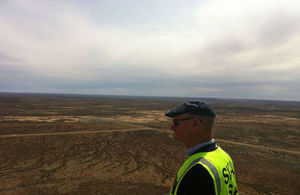The SKA takes off with £119M contribution from the UK
Science Minister, the Rt Hon David Willetts announced funding of £100M (€120M) for the Square Kilometre Array (SKA) project

David Willetts visits SKA South Africa site
The UK Science Minister, the Rt Hon David Willetts announced funding of £100M (€120M) for the Square Kilometre Array (SKA) project, speaking ahead of an event at Jodrell Bank Observatory today. The emblematic observatory hosts the headquarters of the SKA Organisation, which leads the project. This announcement is part of a wider UK government investment of £300 million to support growth and jobs in UK science. Science and Technology Facilities Council (STFC) also confirmed that it is investing £19M over the next four years in the SKA project.
“After the International Space Station and the Large Hadron Collider the world’s next great science project is the Square Kilometre Array,” declared the Minister. “Investment in science is a crucial part of this government’s long-term economic plan. It’s about investing in our future, helping grow new industries and create more jobs – and that will mean more financial security for people across the country.”
This represents a major investment in the SKA, whose first phase (Phase 1) of construction has been cost-capped at €650M.
Under the current schedule for the project, funding for construction of Phase 1 is due to be confirmed by 2016 with start of construction expected in 2018 and early science expected to start in 2020.
Effectively, Minister Willetts’ announcement secures a significant portion of the construction budget for Phase 1, bringing the project that much closer to taking off.
Following the announcement Prof. Phil Diamond, Director General of the SKA Organisation, said: “This is a really exciting announcement for the SKA and a solid proof that the project is now really underway. With such a major investment secured there is no stopping it”.
The SKA project is an international effort to build the world’s largest radio telescope. In a huge leap forward in both engineering and research & development, the SKA will use hundreds of dishes and hundreds of thousands of antennas connected together by optical fibre, and co-located in Africa and in Australia. Thanks to its sheer scale, the SKA will tackle transformational science questions, ranging from black holes, galaxy evolution, dark energy, cosmic magnetism, even gravity and life in the Universe itself.
The SKA project has been moving forward at a steady pace with the establishment of the SKA Organisation as the supervising body to oversee the project in 2011, the dual site selection in 2012 and the start of the final design phase of the project in November 2013, with the selection of 11 teams -so called consortia- each designing a specific element of the telescope. This represents over 350 scientists from 100 organisations from the public, private and industrial sectors in some 20 countries around the globe, working on designing this revolutionary machine.
Prof. John Womersley, CEO of the UK’s Science and Technology Facilities Council (STFC) and chair of the SKA Board, said: “It’s fantastic news for the SKA. This represents a significant investment on behalf of the UK and, along with our other contributions, aims to confirm the UK’s leading role in key aspects of the project”.
STFC also confirmed that it is investing £19M over the next four years in the SKA project, made up of a capital investment in Big Data of £11M and a further £2M a year in the on-going core programme.
The UK is already heavily involved in the effort to design the computing and software for the project which will have a data processing capacity 1,000 times greater than currently available.
The £19M from STFC will be made up of grants to the three main SKA technical institutes in the UK, the Universities of Cambridge, Manchester and Oxford, along with the University College London and the University of Southampton.
The announcement comes as the SKA’s Board meeting is taking place at the SKA Headquarters, with high-level representatives from all 11 member countries attending. In another confirmation of the SKA’s convincing development, more member states are also expected to join the SKA Organisation in 2014.
Notes for editors
- Further details on the SKA can be viewed on the SKA website
- SKA images
- SKA videos
- Amazing facts on the SKA
About the SKA
The SKA project is an international effort to build the world’s largest radio telescope, with a square kilometre (one million square metres) of collecting area. The scale of the SKA represents a huge leap forward in both engineering and research & development towards building and delivering a radio telescope, and will deliver a correspondingly transformational increase in science capability when operational. Eleven countries are currently members of the SKA Organisation – Australia, Canada, China, Germany, India (associate member), Italy, New Zealand, South Africa, Sweden, the Netherlands and the United Kingdom.